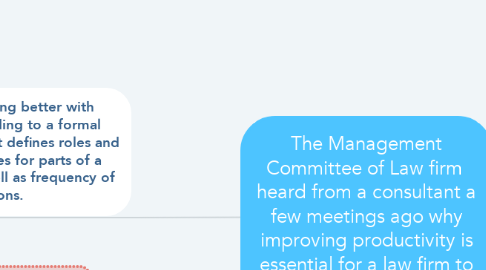The Management Committee of Law firm heard from a consultant a few meetings ago why improving productivity is essential for a law firm to compete.
by Amina Suleimenova

1. Communicating better with clients according to a formal template that defines roles and responsibilities for parts of a matter, as well as frequency of communications.
2. Expanding the use of detailed checklists and playbooks.
3. Types of productivity improvements
3.1. earning more from the same lawyer hours; and some involve improving the service delivery model – re-engineering the way lawyers collaborate and the resources they use.
3.2. he purpose of a strategy is to be distinctive. Firms with good strategies, and good execution of these strategies, can compete primarily based on expertise and other non-price factors, thereby improving profitability of work performed by the same lawyers.
3.3. For work that is generally fungible across firms, competition will be based on price. In order to reduce the cost in line with the value being delivered, the firm can change from a typical partner-associate delivery model to use of less expensive contract lawyers and outsource providers, managed by a senior associate or Of counsel, and emphasizing standard forms, standard processes and new technology.
3.4. Joint venture with a client. A firm may choose to partner with a client on a mutually beneficial service improvement project.
3.5. Avoid perverse incentives. If pushing work down is a goal, the firm should move away from billable hours targets for partners and even senior associates.
3.6. Improve practice group management. Regular and substantive practice group meetings can be part of an overall improvement in collaboration.
3.7. Build an experience database to find similar matters.
4. Analyzing profitability of matters, understanding why some matters are more profitable and then emphasizing the drivers of profitability, whether that be certain types of matters or a certain way of managing matters;
5. Offering temporary discounts to put excess capacity to work;


